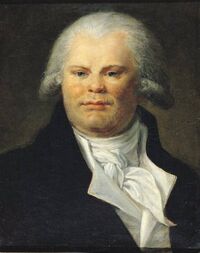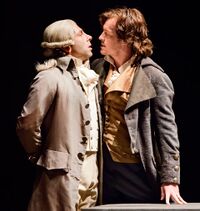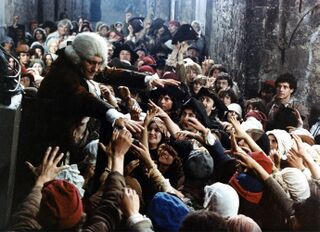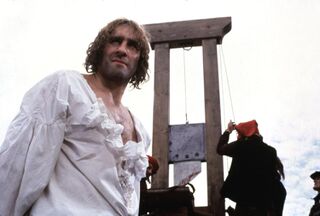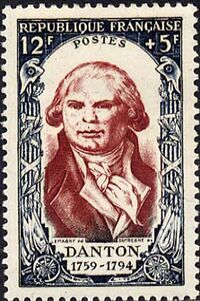Georges Danton
Georges Jacques Danton (26 October 1759 – 5 April 1794) was a leader of the French Revolution who was even uglier than the actor who once played him in a French movie.
Danton today is seen as a 'hero' of France. Streets and battleships are named after this Jacobin responsible for the deaths of Louis XVI and Marie Antoinette. Even guard dogs carry the name of the man who helped to define France's big leap from monarchy into anarchy.
Early life
Danton was born in Arse-sûr-Teakettle in Northeastern France into a family that was not wealthy but still somewhat respectable. He married Antoinette Charpentier in 1787, who gave him six years and three sons. Thereafter, he hoped for improved numbers with Louise Sébastienne Gély, though the statistic of note is that she was less than half his age.
Both smallpox and a close encounter with several wild animals were formative moments in Danton's face, though many historians say that these were mere flourishes on a canvas that was already the result of two copies of the ugly gene.
The reader will have discerned from all these year numbers being bandied around that Danton experienced second-husbandhood in the midst of the French Revolution. Danton's first experience with the Revolution was as the president of the Chandeliers Club, named after the place up in which they held all their meetings. The Chandeliers espoused the principle that France should be a land of popular sovereignty, never once weighing what would happen when the sovereign should feel like waterfalls of blood.
Danton's experience at clubbing landed him the presidency of the Committee of Public Safety. His signature contribution in this rôle was to mandate an Emergency Stop button on all guillotines, though he neglected to specify a standard location and thus could not avail himself of it at a very important moment.
Reign of Terror
Paris was intently watching the American Revolution with hopes of adapting it to their own situation. The squeamish Yanks insisted their Revolution was not about democracy, but the French Revolution "put people first." And, while the Yanks tolerated only such bloodletting as needed to induce the Crown's soldiers to sail back to "the dark hell-hole from whence they came," in France the bloodletting was the main attraction.
Mob violence, early and often. But not too much. Danton reasoned that, when it showed signs of getting out of hand, they would simply "dial it back," much like the view of the modern Federal Reserve about printing up greenbacks and frittering them about.
Finally, while the pedestrian Yanks invented uninspiring terms such as the Congress, Danton et al. centered on the euphemism, from the "Committee of Public Safety" to the "Committee of General Security" to the "Self-denying Ordinance." Modern American government, from "Homeland Security" to "Human Services," can trace its lineage to this era.
One term that was not a euphemism at all was "Reign of Terror," which Danton both inspired, rode herd on, and belatedly tried to "rein" in. By this time he had also taken out a membership with the Jacobins, a rowdy political debating club and a lap dancing venue.
In June 1791, it occurred to Queen Marie Antoinette, and eventually to her husband Louis XVI himself, that they would be wise to move to any location where not a lot of people were expecting them to be. Unfortunately for them, a lot of people were expecting them to do just that. They were hustled back to the Tuileries Palace, which effectively became their prison, albeit one with chefs, chambermaids, concubines, and fawning courtiers.
Antoinette opened a dialogue with backers of a constitution, including Lafayette Radio, to see whether they would split the difference and go for a "constitutional monarchy" with a continuing role for the monarchs, on top of it. However, these moderates were not the only faction; there were also the extremists, led by Lafayette's counterpart, Heathkit. Danton was behind a public protest, and the constitutionalists were behind an extermination, referred to as the massacre of the Champ de Mars, which after all is a foolish name of a place to gather if one doesn't expect something violent to happen. Danton feared a backlash, and removed to England for the rest of the Summer so as not to experience it first-hand.
When school was back in session, its first and only work was to pass a term-limits law that immediately disqualified every sitting member from sitting. This locked up the Constituent Assembly and France had to turn to something new, the Legislative Assembly, not yet distinguished by legislation but by the fact that the same scoundrels could take seats despite being term-limited out of the old joint. Danton obtained a minor seat in the Paris commune, where he smoked a lot of dope and took part in the frequent orgies.
By April 1792, the bread lines were getting long and the people were getting restless. There was only one obvious solution: Declare war on Austria. Remarkably, the French people did not unite in eager patriotism to defeat the foreign Hun. Instead, they stormed the Palace, forcing Antoinette and "Sweet Sixteen" himself to camp out where most leaders retreated for some shut-eye: the legislature. Historians disagree on what part Danton took in organizing this protest. However, they all agree that, the morning after, he was the Minister of Justice.
That was the end of many things, including the Legislative Assembly, the King, the Queen, two forts on the border with Austria — whose people, despite their shocking disinterest in fine meals of truffles and escargots and smoking Gitanes afterward, sure knew how to swing battle-axes — also Danton's tenure as Minister of Justice, in favor of a major part in the year's next legislature, the National Convention. He found himself side-by-side not just with Lafayette and Heathkit, but Best Buy and Radio Shack, confrères none of whom he trusted further than he could throw them. However, the best practice is to "go along to get along," and Danton voted with the majority to separate Louis XVI from the portion of him below the neck. Danton took a notorious victory lap, and went from there to an effort to concentrate more power in even fewer hands. The bread lines were longer after the power was concentrated, but there was one more important problem to solve first: the continued pulse of Danton's opponents, the Girondists.
As always, public opinion was easily malleable, given a large enough mallet, and soon the Convention had dictatorial powers, France had declared war on England, Spain, and Portugal, the bread lines were even longer, and it was time to offer a real solution: Price controls. Also, killing 40,000 of those who disagreed.
This is the point at which some historians claim Danton tried to dampen the Reign of Terror. Unfortunately, once you pull out the control rods, even fire extinguishers do not work. The movement eventually reached Thermonuclear Reaction, and the public clamored to do to Danton what had gotten done to it.
Arrest, trial, and execution
Danton followed the first rule of palace intrigue during a bloody revolution: Always remain popular. However, you cannot please everyone, especially when his name is Maximilien Robespierre. Evidence that Danton profited from his statecraft began to mount, if one reads it the right way. There were letters casually referring to payment of bribes, and a certain horse-drawn cart containing 100 tons of table linen. This would command a high price in Paris, even though there was now no bread on the table at all. After his whirlwind remarriage, he was accused of taking Gély rolls in the stationery closet. Finally, on 30 March 1794, Robespierre got Danton arrested, despite an unwilling arresting officer, presiding judge, and most everyone else in attendance.
In the following week, Robespierre single-handedly devised most of the innovations now known as revolutionary justice, including operating a trial without most of the personnel required by law, and providing alternatives to "clear and convincing evidence." At length, the National Convention ruled that the accused could be removed from the courtroom:
- For throwing spit-wads at the prosecutors
- For speaking out of turn
- For having a surname beginning with D.
These innovations permitted justice to be generated more efficiently. Likewise, Danton's request to confront his accusers on the witness stand was seen as a diversion that was incompatible with the hallmark efficiency of the French, especially when he called to the stand the entire membership of the Committee on Public Safety, and of the Republic of Gabon. Danton also called Robespierre to the stand, but the latter insisted that one of the best principles of good management was to "delegate authority."
Following a minimum of threats by the prosecutor to the smallish jury, a verdict of Guilty was obtained, and a march to the guillotine was arranged, notably including several enemies-of-the-state who had not been on trial at all. The man who had said, "We need audacity, more audacity, and always audacity" showed none of it at all on the slow march to his execution, not even the initiative, when the march passed a chocolatier, to "dip inside for a snack" and leave by the back door. He simply waited his turn and got decapitated like any good Company Man would. Historians believe his last moments were spent regretting that he had failed the proletariat — either that or vice versa.
Danton, the re-make
When film-makers were green-lighted to bring Danton to the silver screen, an immediate red flag was that they would have to cast an actor to play Georges Danton. This was problematic, as few actors have taken so many whacks with the proverbial ugly stick. They selected Gerard Depardieu, mostly because the studio realised it would not have to pay to have monogrammed shirts made up, but he would bring his own.
In the film, Danton's faction is played by familiar Frenchmen, while Robespierre and his cronies were portrayed by swarthy Poles. This technique would later be used in Star Wars, where everyone in the Empire is a British actor, and we all know that the Bad Guys talk funny. Another technique also seen in Star Wars was extreme cost reduction. That science-fiction flick was filmed using cheap computer graphics to avoid the actual destruction of any Death Star. In Danton, the key "trial" scene was filmed using only seven "jurors."
Depardieu is now a citizen of Russia, where there are many hardships — including a complete lack of shops where one can order take-away in French — but a 75% tax on his royalty checks is not one of them.
See also
| Featured version: 2 December 2016 | |
| This article has been featured on the main page. — You can vote for or nominate your favourite articles at Uncyclopedia:VFH. | |
